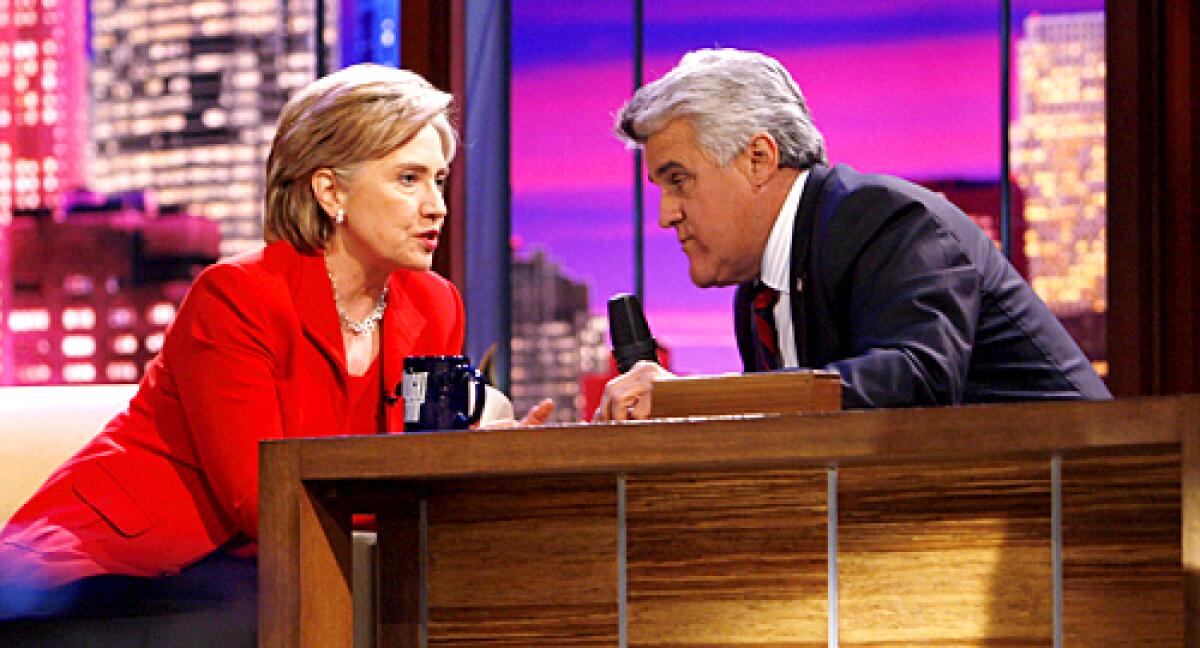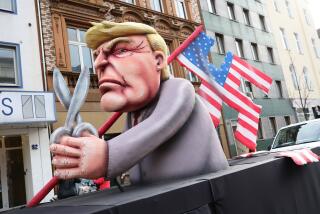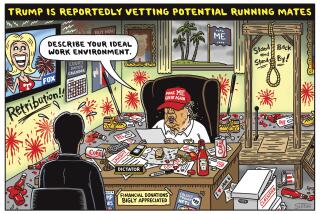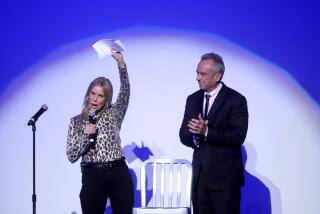Candidates show they can take a joke

THIS is the election that made politics a joke.
Or maybe it’s the campaign in which politics discovered its sense of humor.
Either way, humor has become not only entertainment but also a major campaign tool in the 2008 presidential election cycle. Rarely a week goes by when a presidential contender isn’t making an appearance on one of the many comedy shows on network and cable television.
“It is no surprise that politicians are going to where they have an audience,” said longtime producer Norman Lear, who at age 85 has written more laugh lines than any politician has ever heard. “The politicians are in the business of seduction. And what better atmosphere to be seductive than where it is light and happy?”
People who are willing to make themselves the butt of a joke look like mensches. With all three candidates working to fix their image in the voters’ minds, a mensch isn’t a bad thing to be. They could do worse, a lot worse.
Blogger, journalist and author Daniel Kurtzman, whose Political Humor site on About.com is the most comprehensive anthology of political humor going, believes that comedy is the one of the “best ways for a politician to burnish their image.”
Kurtzman points out that the candidates are visiting the chat shows more often than ever before. “A Gallup poll recently found that 8 out of 10 people surveyed think it’s important for the president to have a sense of humor. And it’s not just because they expect a president to make them laugh. It signals who they are as a person. It shows they can take a joke.”
With the influx of young voters in this election cycle, humor has risen in importance because comedy is a critical part of the younger generation’s cultural vocabulary. This is the first generation raised on YouTube and a 24-hour comedy channel, a group that doesn’t distinguish too closely among Jon Stewart and Stephen Colbert and the front page of the local newspaper. A recent study by the nonpartisan Pew Institute found that, in fact, young voters were getting the majority of their news from heretofore unconventional sources, such as Colbert and Stewart.
And in such a campaign appearance on the late night (and even early morning) talk shows have become the equivalent of the traditional whistle-stop.
For example, when presidential contender Sen.Hillary Rodham Clinton faced a credibility crisis concerning the account of her visit to Bosnia as first lady, she defused the issue with her recent guest spot on Jay Leno’s show.
“It’s so great to be here,” the New York Democrat said as she sat down in Leno’s Burbank studio last week. “You know, I was worried I wasn’t going to make it.” Feigning concern, she added: “I was pinned down by sniper fire.”
Her host shot right back: “You know, in L.A. that might be true, actually.”
Leno friend and longtime Hollywood publicist Dick Gutman points out that, this year, comedy has crossed from the talk shows to TV’s news division.
“I think the spirit of the Lenos and theBill Mahers and the Jon Stewarts have infused these guys,” Gutman says. “They are all in competition. You can tell the truth much more quickly with a quip than with a fact -- and facts don’t get repeated around the water cooler the next day.”
Comics use humor to link politics and pop culture. For example, Lewis Black’s highly topical Comedy Central show this week featured a mock trial to determine whether Paris Hilton or Vice President Dick Cheney was really the root of all evil in America.
Humor also lets comics take on issues that can make the political press squeamish. For example, on the issue of Sen. John McCain’s age, Leno said this week: “McCain is now crisscrossing the United States campaigning. Or, as they’re calling it, ‘Antiques Roadshow.’ ”
On race, Maher joked: “Seventy percent of Americans in a new poll say they share Barack Obama’s values. In particular, a complete disinterest in bowling. . . . Did you see that? He was in Pennsylvania trying to get the redneck vote. He bowled. He’s a lefty. He bowled a 37. Wow, is he black enough for you now?”
And Conan O’Brien had this to say about the quest for superdelegates: “Gen. [David H.] Petraeus, the top general in Iraq, testified on Capitol Hill today, and he was questioned by Sens. Barack Obama and Hillary Clinton. That’s right, Obama and Clinton both had the same question of Petraeus: ‘Are you, by any chance, a superdelegate?’ ”
“It’s often late-night comedians who are the ones with the guts to call politicians on their hypocrisy,” Kurtzman said. “They not only make people laugh, they make people think and listen.”
Lear takes the long view and points out that the seeds of today’s political comedy renaissance were actually sown in the early days of live TV, when politicians used Jack Paar’s “Tonight Show” as the place to look hip.
“I was watching the old Jack Paar show on my iPod,” Lear said. “There was Bobby Kennedy and Jack Kennedy and Richard Nixon. They were all on Paar, who was droll and funny. Richard Nixon played the piano. They even brought in 15 guitars. It wasn’t funny, but he played well.”
The difference is that Paar booked the politicians as a way of showing his serious side with his insomniac audience.
Leno, Letterman and Colbert treat today’s candidates as part of the act.
More to Read
The biggest entertainment stories
Get our big stories about Hollywood, film, television, music, arts, culture and more right in your inbox as soon as they publish.
You may occasionally receive promotional content from the Los Angeles Times.






